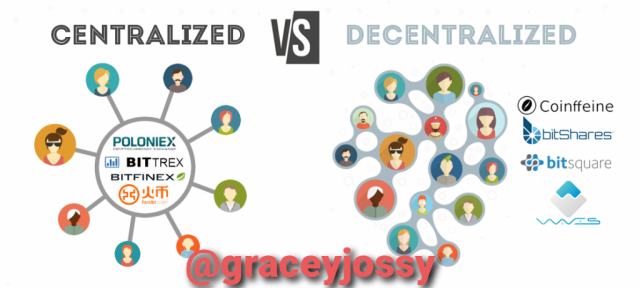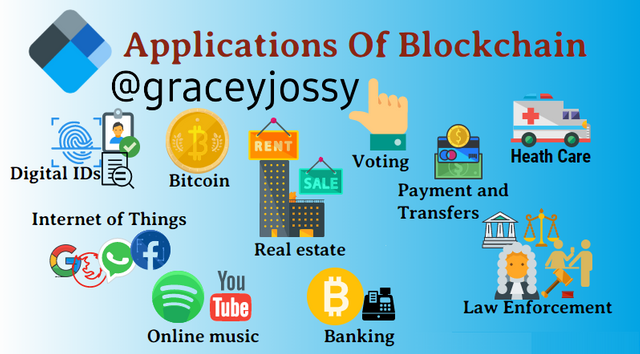
Homework Task-4 Question 2
1. Define decentralization.
b. Describe the advantages and disadvantages of a decentralized system.
c. In what areas of life can a decentralized blockchain be helpful? (write in own words).
INTRODUCTION
Good day fellow great minds, my name is Josiah Grace with username @graceyjossy and on this article, I'll be expanding our knowledge on decentralization, its characteristics to know the different ways of identifying a decentralised system from a centralized system, its importance and effects, and how we can maximise a decentralised blockchain and also considering the ways it affects our lives.
DEFINE DECENTRALIZATION
Decentralization is an antonym of the word centralization which is defined as a system that is governed by a central or single, an example is an organization that manufactures DELL products like a phone charger or computer.
Decentralization can be defined as a system or process that is not governed or owned by any central, official body or authority, rather its coordination, regulation, control and matters concerning the system are dispersed or transferred to multiple central owners and a perfect example of this system is Fast-food franchise chain where the responsibility of each restaurant in the chain depends on the respective restaurant and DEX.
Decentralisation is an extension of delegation where a part of the work in the system is delegated to others, and it spreads to the least level of the organisation. It is secure, significantly less or cheap and free.
Unlike a centralized system that has your personal information, in a decentralised system, a user's information and identity are secured and protected. In a decentralized system, the power to make decisions, control affairs concerning the system has been given to different subunits and constituents of the whole system. User's personal information can not be searched because a decentralised network functions on a mechanism known as peer-to-peer which permits user computers to interact directly, giving a third party or middleman no access to your information, taking you directly to the client.
KEY TAKEAWAY:
The level of decentralisation can be determined by the nature of the authority entrusted, how far down in the system or organisation it is delegated and how consistently it is entrusted. Therefore its level is determined by the authority given.
CHARACTERISTICS OF A DECENTRALISED SYSTEM
The following are the characteristics of a decentralized system.
Facilitates the rate of decision making :
Since each subunit controls their affairs, there's no need for them to wait for the central authorizing body to make decisions on their behalf because they could take a longer time to come up with decisions that they think would be the best for the entire organisation.
In decentralization, it isn't so, as each unit controls their affairs, and they don't need to go through the difficult process of considering the whole system to make or readjust decisions.It supports separation of power and authority to individuals :
This simply means that each participant, subunit, etc is in control of their affairs giving nobody or singular person that authority. This is the true meaning of decentralisation.Increased level of accountability in members :
Decentralization causes each subunit or participant in the system to be fully responsible and accountable for every they make since they are in charge and control of their affairs.Encourages motivation of each member :
Since a decentralized system can make decisions faster, readjust quickly and re-strategize than a centralized system, then it would encourage an environment for learning.
Motivated participants can experiment with new ideas knowing that the system allows them to try new things and quickly change decisions when new ideas prove unsuccessful.
In the next paragraph, I will be throwing more ideas on my explanation above which states that the responsibility of each restaurant depends on DEX (Decentralized Exchange) in a Fast-food franchise chain is an example of decentralization.
!
Note: The image is a screenshot from (https://coinmarketcap.com/)
Blockchain technology is built on the foundation of a Decentralized system. DEX is an exchange market in the cryptocurrencies world that permits trading in a peer-to-peer system and this method isn't controlled by a central authority. On blockchain technology, this means that a blockchain is built in a way that individual users are responsible for their activities and no one has control over another's activities.
It is therefore advisable that blockchain technology users must be careful with their operation on the system to avoid irreversible mistakes.
Having been enlightened on Decentralized Exchange (DEX), the table below shows the differences between a centralized and a decentralized system.

| CENTRALIZED | DECENTRALIZED |
|---|---|
| A single person or authority controls the whole system | Gives ownership to all users |
| Slow decision-making process and is made by a central authority | Fast decision-making process and made by its members |
| Formal communication process | Communication is of any kind |
| Slower output | Fast in output |
DESCRIBE THE ADVANTAGES AND DISADVANTAGES OF A DECENTRALIZED SYSTEM.
ADVANTAGES OF A DECENTRALIZED SYSTEM
The advantages of a decentralised system are as follows;
Security : A decentralised system is if high security and less prone to easy access by hackers or faulty online problems since the entire system is not under any singular control.
Decision making : A decentralized system is very fast in decision making because ideas from the separate unit need not be sent to the central authority for verification, rather a user has the opportunity to quickly experiment with their ideas to get quick feedback.
Transparency : Since blockchains are not open to everyone because they are ledgers and a lot of miners are involved in the process of validating transactions and no individual miner is in charge of validating these transactions and so it is difficult to commit fraud.
Power is dispersed : There is equality of power as no member is greater than the to exercise power.
Enhances Growth of the organisation : Every individual can exercise power to develop and manage their resources. These abilities can be beneficial to the growth of the system. It also creates healthy competition in subunits.
DISADVANTAGES OF A DECENTRALIZED SYSTEM
To everything that has an advantage, there is a disadvantage. Therefore, the following are some disadvantages of a decentralized system.
Cost intensive : Its establishment requires a lot of money.
Lack of coordination and orderliness : Since power is given to the different individual subunits, it makes it kinda difficult to coordinate the general organisation of the whole system when the time comes.
Cash can be lost when transferred to the wrong account.
Lack of specialization : Sometimes there's a lack of qualified personal because most people are involved, and when power is evenly distributed, it is been given to unskilled individuals and every person is involved in all activities.
Conflicts : In decentralisation, more pressure is put on divisional heads to realize profits at any cost. Most times in meeting their new profit plans conflicts among managers.
IN WHAT AREAS OF LIFE CAN A DECENTRALIZED BLOCKCHAIN BE HELPFUL? (WRITE IN OWN WORDS).

Decentralisation tends to be the hope of the future and so renders a lot of help and support to livelihood and below are some of the help it renders.
Education : The educational system now is not what it used to be as a result of lack of transparency, but with decentralisation, all data of an individual is fully displayed with no manipulation.
Government : There are a lot of issues of corruption, embezzlement and so on which has severely damaged a lot of nations. But to change this and improve the transparency of government operations in monetary transactions and politics, the government has to place their financial transactions in a decentralised blockchain which can also be used to cast and store votes making it difficult for hackers to tamper with.
Banks : The operation of banks is done on a centralized platform making individuals pass through a lot of pains today because their Bank account was hacked. But with the decentralization of blockchain to the running of banks, it will not be heard that a person's account is hacked.
CONCLUSION
Having looked at decentralization and how it is different from centralization, its advantages and disadvantages, I'll therefore conclude this article by saying that the implementation of decentralized blockchain technology will reduce the rate of false activities, corruption in the world, it is a great answer to transparency problem and will cause speedy change on the way operations are being done in the world.
Thank you for reading through.
Special thanks to Professor @yousafharoonkhan for the wonderful lesson and exercise.